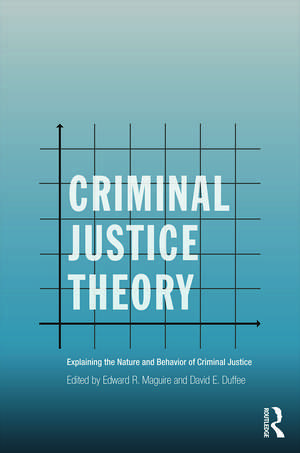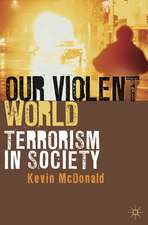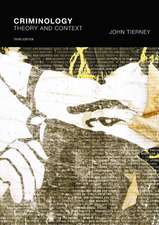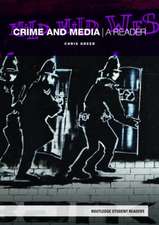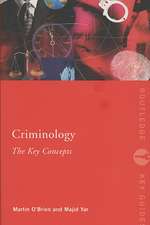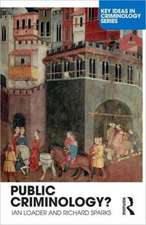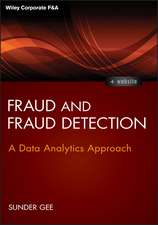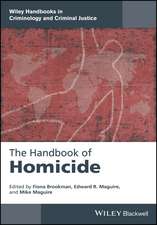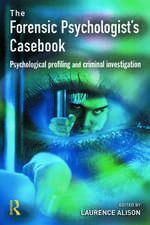Criminal Justice Theory: Explaining the Nature and Behavior of Criminal Justice: Criminology and Justice Studies
Editat de Edward Maguire, David Duffeeen Limba Engleză Paperback – 3 mar 2015
| Toate formatele și edițiile | Preț | Express |
|---|---|---|
| Paperback (1) | 576.00 lei 43-57 zile | |
| Taylor & Francis – 3 mar 2015 | 576.00 lei 43-57 zile | |
| Hardback (1) | 1339.62 lei 43-57 zile | |
| Taylor & Francis – 24 feb 2015 | 1339.62 lei 43-57 zile |
Din seria Criminology and Justice Studies
- 15%
 Preț: 582.24 lei
Preț: 582.24 lei -
 Preț: 311.41 lei
Preț: 311.41 lei -
 Preț: 142.53 lei
Preț: 142.53 lei - 8%
 Preț: 391.95 lei
Preț: 391.95 lei - 8%
 Preț: 488.23 lei
Preț: 488.23 lei -
 Preț: 125.78 lei
Preț: 125.78 lei - 9%
 Preț: 640.26 lei
Preț: 640.26 lei - 8%
 Preț: 418.19 lei
Preț: 418.19 lei -
 Preț: 453.84 lei
Preț: 453.84 lei -
 Preț: 349.80 lei
Preț: 349.80 lei -
 Preț: 340.85 lei
Preț: 340.85 lei - 18%
 Preț: 1000.27 lei
Preț: 1000.27 lei - 15%
 Preț: 542.51 lei
Preț: 542.51 lei -
 Preț: 465.39 lei
Preț: 465.39 lei - 15%
 Preț: 578.93 lei
Preț: 578.93 lei - 22%
 Preț: 459.60 lei
Preț: 459.60 lei -
 Preț: 309.27 lei
Preț: 309.27 lei - 22%
 Preț: 431.22 lei
Preț: 431.22 lei - 5%
 Preț: 481.73 lei
Preț: 481.73 lei - 21%
 Preț: 421.03 lei
Preț: 421.03 lei -
 Preț: 449.72 lei
Preț: 449.72 lei - 18%
 Preț: 1116.02 lei
Preț: 1116.02 lei - 23%
 Preț: 327.80 lei
Preț: 327.80 lei -
 Preț: 351.80 lei
Preț: 351.80 lei - 15%
 Preț: 624.48 lei
Preț: 624.48 lei - 18%
 Preț: 808.08 lei
Preț: 808.08 lei -
 Preț: 382.91 lei
Preț: 382.91 lei
Preț: 576.00 lei
Preț vechi: 677.65 lei
-15% Nou
Puncte Express: 864
Preț estimativ în valută:
110.22€ • 115.37$ • 91.74£
110.22€ • 115.37$ • 91.74£
Carte tipărită la comandă
Livrare economică 31 martie-14 aprilie
Preluare comenzi: 021 569.72.76
Specificații
ISBN-13: 9780415715195
ISBN-10: 0415715199
Pagini: 504
Ilustrații: 18 black & white tables, 15 black & white line drawings
Dimensiuni: 152 x 229 x 26 mm
Greutate: 0.67 kg
Ediția:Revised
Editura: Taylor & Francis
Colecția Routledge
Seria Criminology and Justice Studies
Locul publicării:Oxford, United Kingdom
ISBN-10: 0415715199
Pagini: 504
Ilustrații: 18 black & white tables, 15 black & white line drawings
Dimensiuni: 152 x 229 x 26 mm
Greutate: 0.67 kg
Ediția:Revised
Editura: Taylor & Francis
Colecția Routledge
Seria Criminology and Justice Studies
Locul publicării:Oxford, United Kingdom
Cuprins
Part I THE IDEA OF CRIMINAL JUSTICE THEORY. 1. Why Is Criminal Justice Theory Important? 2. Foundations of Criminal Justice Theory 3. Why Is There So Little Criminal Justice Theory? Neglected Macro- and Micro-Level Links Between Organization and Power. Part II THEORIES OF POLICING 4. Explaining Police Organizations 5. Understanding Variety in Urban Community Policing: An Institutional Theory Approach 6. The "Causes" of Police Brutality: Theory and Evidence on Police Use of Force. Part III THEORIES OF THE COURTS 7. Assessing Blameworthiness and Assigning Punishment: Theoretical Perspectives on Judicial Decision Making 8. Courts and Communities: Toward a Theoretical Synthesis 9. A Qualitative Study of Prosecutors’ Decision Making in Sexual Assault Cases. Part IV THEORIES OF CORRECTIONS 10. A Test of a Turnover Intent Model: The Issue of Correctional Staff Satisfaction and Commitment 11. The Construction of Meaning During Training for Probation and Parole 12. Examining Correctional Resources: A Cross-Sectional Study of the States Part V CONCLUSION 13. Directions for Theory and Theorizing in Criminal Justice
Notă biografică
Edward R. Maguire is Professor of Justice, Law & Criminology in the School of Public Affairs at American University in Washington, DC. Professor Maguire received his Ph.D. in Criminal Justice from the University at Albany in 1997. He has held previous positions at George Mason University, the University of Nebraska, the U.S. Department of Justice, and the United Nations. From 2004-2010, he led a series of studies that examined gangs, guns and violence in Trinidad and Tobago. From 2006-2010, he led a field study of sex trafficking in minors in the Philippines. He is currently leading impact evaluations and other studies related to policing, gangs, firearms, violence, and youth risk in El Salvador, Uruguay, the U.S., and several Caribbean nations. He has written or edited three books and more than sixty journal articles and book chapters on a variety of topics in criminology and criminal justice.
David E. Duffee is Professor Emeritus of Criminal Justice, University at Albany, and former dean of the School of Criminal Justice, from which he received his Ph.D. in 1973. His research interests are in planned change in criminal justice agencies and communities and in criminal justice theory. His first work in criminal justice theory, Explaining Criminal Justice, received the book of the year award from the Academy of Criminal Justice Sciences. His two most recent projects were (1) as a member of the research team of Service Outcomes Action Research (SOAR), a continuing partnership between two child welfare agencies and the University at Albany, and (2) as study director for the Assessment Protocol in the Arizona State University sites of Criminal Justice Drug Abuse Treatment Studies II.
David E. Duffee is Professor Emeritus of Criminal Justice, University at Albany, and former dean of the School of Criminal Justice, from which he received his Ph.D. in 1973. His research interests are in planned change in criminal justice agencies and communities and in criminal justice theory. His first work in criminal justice theory, Explaining Criminal Justice, received the book of the year award from the Academy of Criminal Justice Sciences. His two most recent projects were (1) as a member of the research team of Service Outcomes Action Research (SOAR), a continuing partnership between two child welfare agencies and the University at Albany, and (2) as study director for the Assessment Protocol in the Arizona State University sites of Criminal Justice Drug Abuse Treatment Studies II.
Recenzii
This second edition continues to lead the emergence of criminal justice science from the shadows of other disciplinary domains. The clear specification of the criminal justice intellectual domain coupled with examples of scientific criminal justice studies provide students with cogent illustrations of criminal justice science. Maguire and Duffee delivered a vehicle that provides my students a platform from which to more succinctly imagine a criminal justice science.
-Robert Langworthy, Criminal Justice, University of Central Florida
All too often we look at the criminal justice system by what it produces or how it functions without considering the question of "why." The second edition of Criminal Justice Theory helps address this question by providing a critical scholarly discussion of the need for and the importance of developing and understanding the theoretical lynchpins of the criminal justice system. Ed Maguire and David Duffee have pulled together an outstanding collection of articles that help students and scholars alike traverse the structures, practices and processes that help form the criminal justice system.
-Ed Latessa, Professor and Director, Criminal Justice, University of Cincinnati
Criminal Justice Theory marks the coming of age of an independent discipline called criminal justice. Criminal justice does not study crime and thus cannot be mistaken for criminology; it is not the vocational subject described in undergraduate textbooks. As the editors lay out in clear prose with discriminating insight, criminal justice is the study of official response to behaviors that government and various agents of social control deem criminal. In other words, criminologists explain crime and criminal behavior, but criminal justice scholars are committed to explain, theorize, and predict the behavior of criminal justice in all its dimensions and multiplicity. This fine text, thoroughly revised and greatly improved in the new edition, is an indispensable resource for anyone teaching a course in criminal justice in the 21st century.
-Salahuddin Ayub, Criminal Justice, Philosophy, and Political Science, Chicago State University
-Robert Langworthy, Criminal Justice, University of Central Florida
All too often we look at the criminal justice system by what it produces or how it functions without considering the question of "why." The second edition of Criminal Justice Theory helps address this question by providing a critical scholarly discussion of the need for and the importance of developing and understanding the theoretical lynchpins of the criminal justice system. Ed Maguire and David Duffee have pulled together an outstanding collection of articles that help students and scholars alike traverse the structures, practices and processes that help form the criminal justice system.
-Ed Latessa, Professor and Director, Criminal Justice, University of Cincinnati
Criminal Justice Theory marks the coming of age of an independent discipline called criminal justice. Criminal justice does not study crime and thus cannot be mistaken for criminology; it is not the vocational subject described in undergraduate textbooks. As the editors lay out in clear prose with discriminating insight, criminal justice is the study of official response to behaviors that government and various agents of social control deem criminal. In other words, criminologists explain crime and criminal behavior, but criminal justice scholars are committed to explain, theorize, and predict the behavior of criminal justice in all its dimensions and multiplicity. This fine text, thoroughly revised and greatly improved in the new edition, is an indispensable resource for anyone teaching a course in criminal justice in the 21st century.
-Salahuddin Ayub, Criminal Justice, Philosophy, and Political Science, Chicago State University
Descriere
Criminal Justice Theory, Second Edition is the first and only text, edited by U.S. criminal justice educators, on the theoretical foundations of criminal justice, not criminological theory. This new edition includes entirely new chapters as well as revisions to all others, with an eye to accessibility and coherence for upper division undergraduate and beginning graduate students in the field.
